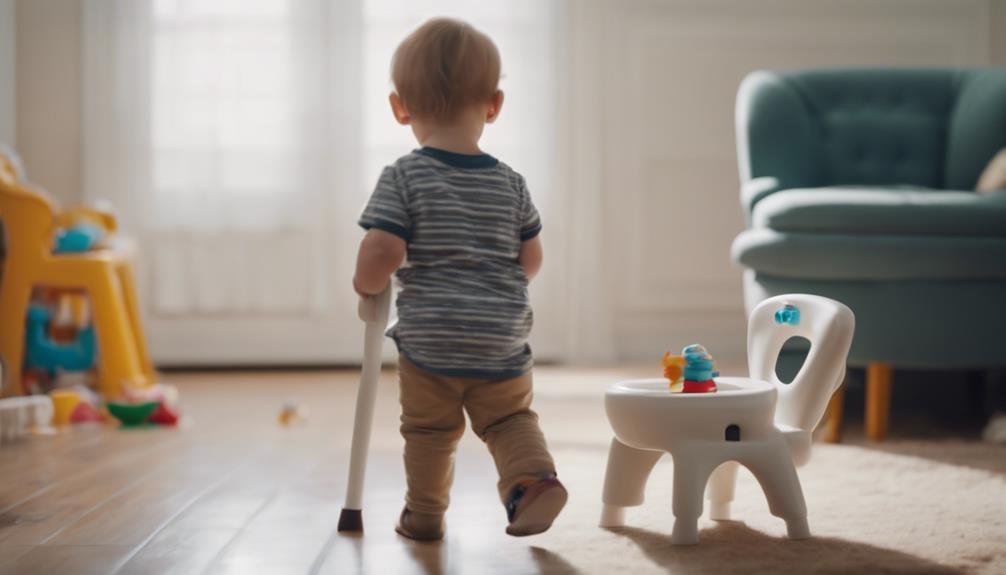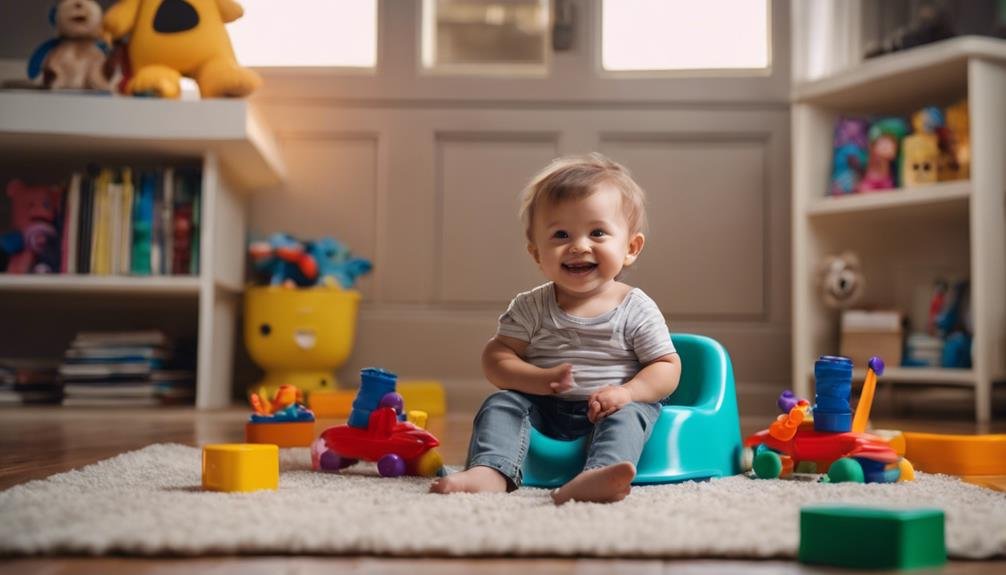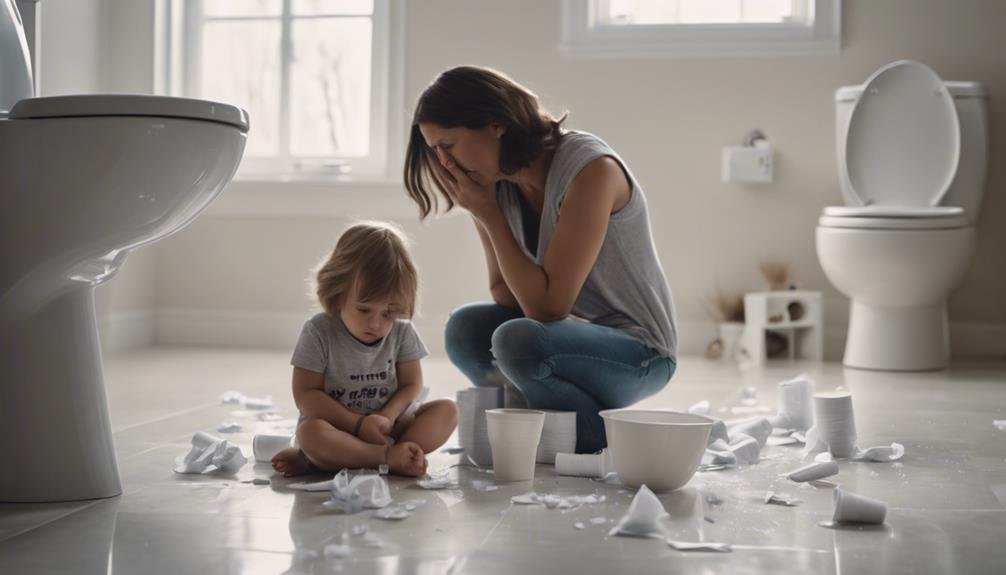"Cherishing Little Steps - A Haven for Baby and Family Journeys"
Potty Training 101: A Step-by-Step Guide for Parents
As a parent venturing into the realm of potty training, you may find yourself facing a myriad of questions and uncertainties. The journey of guiding your little one through this essential milestone is both rewarding and challenging. How can you navigate through the signs of readiness and establish a successful routine? What are the key strategies to encourage independence and handle setbacks with grace? Stay tuned as we uncover the essential steps in the potty training process, equipping you with the knowledge and confidence to support your child every step of the way.
Key Takeaways
- Establish a consistent routine for potty breaks.
- Encourage independence in the bathroom routine.
- Use positive reinforcement for successes.
- Create a cozy and welcoming potty area.
- Teach proper wiping technique for good hygiene.
Signs of Readiness

Before you begin potty training, it's important to recognize the signs of readiness in your child. Understanding these cues can make the process smoother and more successful. One of the key indicators is when your child starts showing an interest in the bathroom or in using the toilet. They might imitate adults or older siblings, showing curiosity about the potty. Another sign is when your child can communicate their needs effectively. If they can express when they need to go or have already gone, it's a positive sign that they're ready for potty training.
Additionally, physical signs like staying dry for longer periods, being able to pull their pants up and down, and showing signs of discomfort in a soiled diaper are all indications of readiness. Emotional readiness is also important; your child should be willing to participate in the process and show some independence. Remember, every child is different, so look for a combination of these signs before starting the potty training journey with your little one.
Setting the Stage
To set the stage for successful potty training, ensure you create a comfortable and inviting environment that encourages your child to engage with the process positively. Potty training can be a big step for both you and your child, but with the right setting, you can make it a smoother and more successful journey.
Here are some tips to help you create the ideal environment:
- Comfort is Key: Ensure the potty area is cozy and welcoming, with items like a soft rug or their favorite toys nearby.
- Routine Matters: Establish a consistent potty routine to help your child feel secure and know what to expect.
- Positive Reinforcement: Celebrate successes with praise or small rewards to motivate and reinforce good potty habits.
Introducing the Potty

When introducing the potty to your child, encourage exploration and curiosity to familiarize them with this new tool for potty training. Let your child touch, sit on, and even play around the potty to help them feel comfortable with it. Consider getting a potty chair that's inviting and easy for your child to use. Place the potty in a familiar and accessible location, such as the bathroom, to integrate it into your child's daily routine seamlessly.
Ensure that the potty is at the right height for your child to sit comfortably. Use simple language to explain the purpose of the potty and how it helps with going to the bathroom like a grown-up. Demonstrate how to sit on the potty and encourage your child to imitate. Celebrate small victories and progress to build your child's confidence in using the potty. Remember, patience and positive reinforcement are key during this introductory phase of potty training.
Establishing a Routine
After familiarizing your child with the potty, the next crucial step in successful potty training is establishing a consistent routine. Creating a predictable schedule around using the potty can help your child understand when it's time to go and reduce accidents. Here are three essential tips to help you establish a routine:
- Consistent Timing: Encourage your child to sit on the potty at regular intervals, such as after meals or before bedtime. Consistency in timing helps them anticipate when they need to go.
- Celebrating Success: Praise your child each time they successfully use the potty. Positive reinforcement helps reinforce good habits and boosts their confidence.
- Stay Patient: Remember, learning to use the potty is a significant milestone for your child. Be patient and supportive, even if there are setbacks along the way. Your understanding and encouragement will help them feel more at ease with the process.
Encouraging Independence
Encourage your child to take ownership of their potty training journey by fostering independence in their bathroom routine. Independence is a crucial skill for your child to develop during this process. Start by allowing them to participate in choosing their own special potty seat or stepping stool, making them feel involved and excited about this new milestone. Encouraging them to undress and dress themselves before and after using the potty can also boost their confidence and sense of accomplishment.
Another way to promote independence is by teaching them how to wipe themselves properly. Use simple, clear instructions and demonstrate the correct technique, then let them try on their own with your guidance. Additionally, show them how to wash their hands thoroughly after using the potty, emphasizing the importance of good hygiene.
Dealing With Accidents
To effectively handle accidents during potty training, remain calm and offer reassurance to your child while assisting them in cleaning up the mess. Accidents are a normal part of the potty training process and can happen even with the most prepared children. Here are some tips to help you navigate through accidents with patience and understanding:
- Stay Calm: Your child looks up to you for guidance, so maintaining a composed demeanor will help them feel at ease during this mishap.
- Provide Encouragement: Assure your little one that accidents happen to everyone and that they're still doing a great job with their potty training efforts.
- Teach Cleaning Up: Involve your child in the clean-up process to instill a sense of responsibility and help them understand the consequence of not using the potty.
Handling Setbacks

When setbacks occur during potty training, remember that they're a normal part of the learning process for your child. It's crucial to approach these setbacks with patience and understanding. Your child is still learning how to control their bladder and bowel movements, and accidents are to be expected along the way. Instead of getting frustrated, take a deep breath, reassure your child that it's okay, and encourage them to try again next time.
During setbacks, consistency is key. Stick to your potty training routine and provide gentle reminders about using the potty regularly. Keep an eye out for signs that your child needs to go and prompt them to use the toilet. Remember to praise and reward your child for any progress they make, no matter how small.
If setbacks persist, it might be helpful to reassess your approach. Consider adjusting your strategies or seeking advice from other parents or a pediatrician. Stay positive, stay patient, and remember that setbacks are just bumps on the road to success in potty training.
Celebrating Success
Celebrate your child's potty training success by acknowledging their achievements with enthusiasm and positivity. Recognizing and celebrating milestones in your child's potty training journey can boost their confidence and motivation. Here are three ways to celebrate their success:
- Praise and Encouragement: Shower your child with praise and encouragement every time they successfully use the potty. Positive reinforcement can reinforce good behavior and make them feel proud of their accomplishments.
- Reward System: Consider implementing a reward system where your child earns stickers, small treats, or special privileges for each successful trip to the potty. This can make the process more exciting and encourage them to keep trying.
- Celebratory Rituals: Create fun and special rituals to celebrate significant milestones, such as a dance party, a special outing, or a favorite meal. These rituals can make your child feel special and create lasting memories of their potty training achievements.
Frequently Asked Questions
How Do I Handle Resistance or Refusal to Use the Potty?
When your child resists using the potty, stay calm and patient. Encourage with positive reinforcement, offer rewards, and maintain consistency. Address any fears or concerns gently. Remember, each child is unique, and progress takes time.
Should I Use Rewards or Incentives for Successful Potty Training?
You might consider using rewards or incentives for successful potty training. Small treats or stickers can motivate your child. Remember, positive reinforcement is key. Celebrate those tiny victories – they're a big deal for your little one!
What if My Child Is Ready Physically but Not Emotionally?
If your child is physically ready but not emotionally, be patient and supportive. Encourage communication about feelings and fears. Offer comfort and reassurance. Celebrate small victories and provide a safe environment for your child to progress at their own pace.
How Do I Handle Potty Training Outside of the Home?
When navigating potty training beyond home, ensure consistency. Pack essentials, like spare clothes and portable potties. Practice positive reinforcement and patience. Embrace setbacks as stepping stones. Remember, accidents happen; stay calm, encouraging, and supportive throughout the journey.
What if My Child Regresses After Making Progress?
If your child regresses after making progress, stay calm and be patient. It's normal for setbacks to happen during potty training. Provide reassurance, maintain consistency, and offer encouragement. Remember, each child learns at their own pace. You got this!
Conclusion
As you guide your little one through the ups and downs of potty training, remember to visualize the end goal: a confident, independent child. Picture them proudly using the potty on their own, with a smile of accomplishment on their face.
Keep pushing through the challenges, stay patient and consistent, and soon enough, you'll reach that beautiful moment of success together. Celebrate each step of progress, and before you know it, you'll be looking back on this journey with pride.


